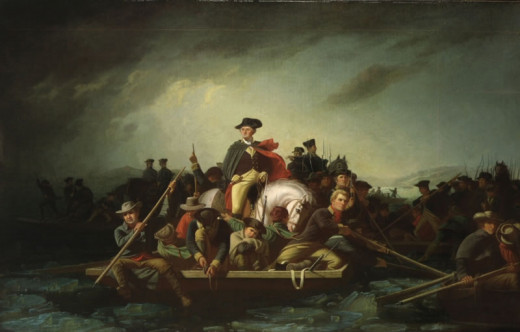Failure To Engage: Why Kids Aren't Interested In Learning
Fun Facts School Didn't Teach You
The ABCs of Keeping Kids Interested
In most schools, History class is a set of dates and names students are required to memorize. The physical sciences are full of complicated and boring sets of formulas that they are taught to plug numbers into and get answers. English consists of reading lists, 1000 word reports, and recitations of Shakespeare. Each and every class has difficulty getting students interested, partly because the teachers' hands are tied by mandatory testing and partly because the teaching techniques used are, quite simply, ineffective.
So let's break down where and how students lose interest in learning in each of those three areas: History, Science, and English.
Washington Crossing the Delaware

A. History
The United States has a habit of messing with the past. However, it's more a matter of sanitizing history than changing it. A report from the American Textbook Council, an organization dedicated to reviewing various recommended textbooks, had this to say on the subject:
"In order to meet demands for scope, diversity and readability, world history textbooks abandon narrative and complexity. They emphasize "Western" subjects. What should be central topics and themes are compressed to make room for new topical material, some of it ideologically loaded.
In subjects ranging from Africa to terrorism, the nation’s leading world history textbooks provide unreliable, often scanty information and provide poorly constructed activities. In doing so, these textbooks foster ignorance of geopolitics and deprive students of authentic global understanding."
To summarize the report, textbooks often omit important and often interesting details for the sake of simplicity. For example, instead of having children memorize dates and read analyses of the Revolutionary War, textbooks (and teachers) should tell stories about grand battles and political intrigue. No 8th grade boy will ever be bored by a dramatic recounting of the naval battle between the U.S.S Constitution and the H.M.S. Guerriere during the war of 1812. It has everything from cannons to high seas adventure (and more cannons.)
History is full of such stories, and in reality, that's exactly what history is: A collection of tales about our past. Nothing can be gained by sanitizing them. Whether it's George Washington poking fun at a hefty general while crossing the Delaware or Australia's rich aboriginal mythology, history is not the dry subject we've all come to hate. History is a beautiful, complex, and often graphic story. History classes fail to engage students because they take a subject many children love, stories of pirates and epic adventures and betrayal, and turn it into a numbered set of questions about dates and names. Give a child a name and a date, and he will never remember the story; but give a child a story, and the names and dates will never leave his mind.
For more reading, James W. Loewen's book, Lies My Teacher Told Me, has some specific examples of omissions or flat out lies told in the classroom. For those on a short time schedule, the comedy website Cracked has a few good articles on the same subject.
First Space Shuttle Mission

B. Science
The things that initially intrigue us about science are its effects on the world around us. Rockets shooting to the moon, beautiful man-made crystals, or something as simple as a baking soda and vinegar volcano. Yet somehow, we take a healthy interest in the laws that govern the universe, and shoot it in the head. Perhaps it's because science classes jump from a toy rocket to complex mathematical equations, and take away the rocket to boot.
Children are natural experimenters; it's how we learn to walk, talk, and do pretty much everything. So why is it that the path to learning science rarely includes high quality experiments? Why do we attempt to teach our children science by shoving them in a tiny seat, giving them a pencil and paper, and telling them to learn what we put on the board?
The best way to teach is through "play." And it never changes. As we grow older, our playthings change, but our inherent desire to tinker never does. A toddler plays with blocks, a grown man plays with sports cars. The biggest problem is that we make the jump from pushing a toy fire engine to "playing" with pencils and calculators far too soon. A favorite past-time of many students is using school supplies in ways they were never intended for. Of course when they do, they are punished for doing what comes naturally to them. Kids learn by experiencing and observing, which in many ways is the basis of modern science. Hypothesize, experiment, experience, repeat.
The key is to channel that playful energy, to give children a goal to accomplish, then teach them the tools to get there. Instead of memorizing rote formulas and only occasionally doing an experiment, schools should teach science by giving students an ambitious goal, allowing them the freedom to get there, and giving them the tools to do it. If we want to teach kids about Newton's laws of motion, have them build a huge Newton's cradle. Mythbusters did it. If you're teaching them about the Ideal Gas Law, splurge and buy a cheap weather balloon. The bonus is that you can re-use it when they do a section on meteorology.
Obviously schools need more funding in order to pay for such grand experiments, but just restructuring the classroom around "playing" works wonders. Adam Savage of Mythbusters fame gave a TED talk about great discoveries from people who were basically just toying around with crazy ideas. Both Adam and his Mythbusters compadre, Jamie Hyneman, are huge supporters of getting your hands dirty to teach science. Why? Because it works, and works well.
Romeo and Juliet

C. English
Shakespeare, Dickens and Steinbeck are names that haunt every high school student's nightmares. While students are still literate, most have abandoned books in favor of other forms of entertainment. Texting and Twitter are the big ones. Unfortunately, instead of looking at why students don't read, we instead take the lazy route and blame the technology.
The failure here is not on the part of phones or social websites, but in taking good source material and destroying its entertainment value. The worst offenders are those who make students READ Shakespeare. Shakespeare was meant to be played, acted on the grand stage, not read. Imagine, if you will, that instead of a classroom of students in nice little rows of nice little desks, a classroom full of students in period clothing acting out the best of the Bard. Again, this is a case of learning through play instead of rote memorization.
Another problem is literary elitism. John C. Hartstock's A History of American Literary Journalism touches on a specific problem, English language elitism. The issue is that teachers often have required reading lists of books that haven't been updated years, and most of the books on these lists are from classical English-American authors such as Dickens or Steinbeck. Just because something like the Hunger Games trilogy was written recently doesn't mean it is any less worthy than To Kill a Mockingbird or Of Mice and Men. While both are fantastic novels, children aren't necessarily going to be interested in them, especially at a younger age.
Even if we discount the poorly chosen source material, the endless cycle of reading and writing reports can stifle a child's ability to learn. While formal and structured essays are important, especially in college, you must first introduce children to the idea of critical review and discussion. Kids learn best when interacting with other kids. Having a child introduce a younger child to a book he or she enjoyed when they were younger forces them to think about why they liked reading the book they're recommending.
Why School Shouldn't Be Boring
Everyone is passionate about something. The key to engaging kids in learning is to find out what that is. It's not a solution, but it is a foot in the door. If the student feels as though the teacher is interested and respectful of what he or she is passionate about, they are more likely to be actively engaged in learning. The plots of many cheesy high school movies revolve around this concept. We've all seen at least one movie where the teacher does something silly to connect with their students, from rapping to dancing to reading Shakespeare in a funny period accent.
Teachers need not go to such extremes (unless they really want to) in order to engage their students. Even a modest effort can gain the trust of the student, and once that trust is won, the teacher can introduce the student to entire new worlds of learning. In some ways, it's like a caramel apple: you coat the surface with something sweet to convince the kid to take a bite, and once he does he realizes the apple isn't half bad.
With administrators backing them, teachers can turn the lack of interest in education around. Some schools have already begun working on new policies that put the focus back on the student as an individual, and not as just another floating federal dollar.
Kids need things to do and play with in schools, but if we don't engage them on their turf, they will look elsewhere for entertainment. It's been said that kids have a short attention span, though anyone who's seen a five year old with Legos knows that's not true. We need to focus on keeping their attention, from toddler to teenager, and beyond.





